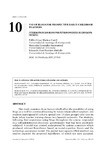Mostrar o rexistro simple do ítem
Use of blogs for prospective early childhood teachers
| dc.contributor.author | Muñoz-Carril, Pablo-César | |
| dc.contributor.author | González-Sanmamed, Mercedes | |
| dc.contributor.author | Fuentes Abeledo, Eduardo José | |
| dc.date.accessioned | 2024-01-25T12:48:54Z | |
| dc.date.available | 2024-01-25T12:48:54Z | |
| dc.date.issued | 2020 | |
| dc.identifier.citation | Muñoz-Carril, P.C.; González-Sanmamed, M., & Fuentes-Abeledo, E.J. (2020). Use of blogs for prospective early childhood teachers. Educación XX1, 23(1), 247-273, doi: 10.5944/ educXX1.23768 | es_ES |
| dc.identifier.issn | 1139-613X | |
| dc.identifier.uri | http://hdl.handle.net/2183/35144 | |
| dc.description.abstract | [Abstract] This study examines those factors which affect the possibility of using blogs as a tool for continued learning by future infant-school teachers. 222 students participated (3 cohorts spread over 13 class groups) who were in basic infant teacher training classes in a Spanish university. The students, following their experience using blogs throughout the course, responded to a self-administered electronic questionnaire that had been previously validated. A model was created underpinned by various constructs which produced relevant hypotheses based on social-cognitive theory and the technology acceptance model. The partial least squares (PLS) method was used to examine the proposed hypotheses, of which ten were accepted. The results indicated that the variables which significantly contributed to students continuing to use blogs to learn were perceived self-efficacy, personal outcome expectations, perceived support for enhancing social ties, along with perceived usefulness, perceived ease of use, attitude and perception of playfulness. The results are discussed and compared with results of other similar research, which allowed the model’s predictive capacity to be replicated and confirmed). Finally, the study provides useful recommendations based on the findings for those teachers who want to use blogs with their university students. and want their students to using them in their learning. | es_ES |
| dc.description.abstract | [Resumen] En esta investigación se analizan aquellos factores que inciden en la posibilidad de uso de los blogs como herramienta para continuar aprendiendo por parte de quienes van a ser futuros docentes en el ámbito de educación infantil. En el estudio participaron un total de 222 estudiantes (pertenecientes a 3 cohortes distribuidas en 13 grupos de aula) que cursaron una asignatura de formación básica perteneciente al grado de maestro de educación infantil en una universidad española. El alumnado, tras su experiencia a lo largo del curso en el uso de blogs, respondió a un cuestionario electrónico auto-administrado y previamente validado. Se elaboró un modelo sustentado por diversos constructos que dieron lugar a hipótesis relevantes derivadas primordialmente de la teoría socio-cognitiva y del modelo de aceptación tecnológica. Se utilizó la técnica de mínimos cuadrados parciales (PLS) para el contraste de las doce hipótesis planteadas, de las cuales se aceptaron diez. Los resultados indican que la auto-eficacia percibida, las expectativas de resultados personales, el apoyo percibido para mejorar los vínculos sociales, así como la percepción de utilidad, la facilidad de uso percibida, la actitud y la percepción de alegría y disfrute, son variables significativas que contribuyen a que los estudiantes continúen utilizando los blogs como mecanismo para aprender. Asimismo, se discuten y comparan los resultados obtenidos con otras investigaciones internacionales similares, lo que ha permitido replicar y confirmar la capacidad predictiva del modelo. Finalmente, se aportan recomendaciones útiles, derivadas de los hallazgos obtenidos, para aquellos docentes que pretendan utilizar blogs con sus estudiantes universitarios, a fin de que estos usen dichas herramientas para desarrollar sus aprendizajes. | es_ES |
| dc.description.sponsorship | Ministerio de Economía, Industria y Competitividad; EDU2015-67907-R | es_ES |
| dc.description.sponsorship | This article was produced within the framework of the project “How the best university teachers learn in the digital age: the impact of learning ecologies on teaching quality”, partly financed by the Spanish Ministry of the Economy, Industry and Business (Reference: EDU2015-67907-R). | es_ES |
| dc.language.iso | eng | es_ES |
| dc.publisher | UNED | es_ES |
| dc.relation.uri | https://doi.org/10.5944/educxx1.23768 | es_ES |
| dc.rights | Atribución 3.0 España | es_ES |
| dc.rights.uri | http://creativecommons.org/licenses/by/3.0/es/ | * |
| dc.subject | Blogs | es_ES |
| dc.subject | Students | es_ES |
| dc.subject | Early childhood education | es_ES |
| dc.subject | Initial training | es_ES |
| dc.subject | Higher education | es_ES |
| dc.subject | Learning | es_ES |
| dc.subject | Estudiantes | es_ES |
| dc.subject | Educación infantil | es_ES |
| dc.subject | Formación docente | es_ES |
| dc.subject | Formación inicial | es_ES |
| dc.subject | Educación superior | es_ES |
| dc.subject | Aprendizaje | es_ES |
| dc.title | Use of blogs for prospective early childhood teachers | es_ES |
| dc.title.alternative | Utilización de los blogs por futuros docentes de educación infantil | es_ES |
| dc.type | info:eu-repo/semantics/article | es_ES |
| dc.rights.access | info:eu-repo/semantics/openAccess | es_ES |
| UDC.journalTitle | Educación XX1 | es_ES |
| UDC.volume | 23 | es_ES |
| UDC.issue | 1 | es_ES |
| UDC.startPage | 247 | es_ES |
| UDC.endPage | 273 | es_ES |
Ficheiros no ítem
Este ítem aparece na(s) seguinte(s) colección(s)
-
GI-EIRA - Artigos [30]






